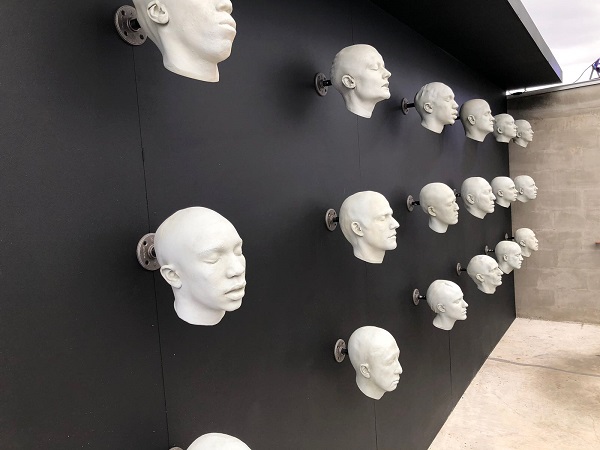
SXSW: Empathy Reigns in Austin

We hit Austin with a bang this past week for SXSW, dividing and conquering to make sure we saw it all: between keynote talks, workshops, experiential (Westworld! Ready Player One! Roseanne!), trade shows, film and music events as well as talking to some inspiring people. We even managed to eat our body weight in cheese, thanks Wisconsin!
Chatting through our outtakes and learnings, it was apparent that no matter what the topic of the talk or experience, the one key theme that ran through them all was empathy. It’s becoming increasingly prevalent in all we do, whether it be AI, Machine Learning, Technology or Branded Experiences. Applying empathy will help us save our jobs, our cities and the world - as well as form stronger bonds between our brands and their customers.
Here we highlight some of the best that we saw - there's not enough space to feature all of our learnings, and Alex Chang inspired us so much that we wanted to do the article through gifs (definitely pronounced with a hard g), but alas words will need to suffice.

Barbara-Ann Chaney - Project Director > 'A Robot Won't Take Your Job, A Human Will.'
Dom Price, Head of R&D & Work Futurist at Atlassian held an interesting presentation entitled 'A Robot Won't Take Your Job, A Human Will.' With the recent exponential growth in AI and machine learning, should we be fearful that the bots are coming to take our jobs? One thing’s for sure, anything that can be automated, will be. Robots offer efficiency & give us solutions based purely on data, not influenced by emotions. Furthermore, robots don’t get sick, have moods, or pay tax. They sound like the perfect employee. But while AI can improve efficiency, it can also go very wrong if the algorithm is not fed with diverse and inclusive data sets. We've seen examples of this with the image recognition function of Google Photos, developed by a majority white male teams and resulting in the AI's inability to recognise African Americans from gorillas. We need to ensure unbiased data is what drives the machine learning of the future, so we can have diversity and inclusion in our AI. To do that, we need to ensure the people leading us into the future are made up of diverse, inclusive and empathic teams. This diversity & inclusions in teams is more important now than ever before, as we head deeper into this AI era. Lone geniuses are not going to make for good, diverse AI.
The robots will most definitely take a lot of our jobs, but as they do, they will create new and exciting roles for us mere mortals. The next generation will have more jobs in their lifetime that we can even think about, as we reinvent and re-imagine our workplaces. As a human, it's no longer just enough to be efficient. Being human is the new superpower but we need to be effective, creative, curious and courageous. Only then will we'll have a place at the table.

Michael Keegan, Technical Director> Bose AR
There were some amazing AR and VR experiences at SXSW this year. The VR cinema showcased a wide range of movies from entertainment and documentary to interactive group experiences. But by far the most interesting experience was Bose AR. It was the audio company’s first SXSW and they brought along a fully functional product demo of their AR sunglasses - a cool pair of shades (far more attractive than something created on a 3D printer had any right to be) with highly directional speakers built into the arms. Built in accelerometers know which way you’re looking and deliver location contextual information directly into your ears, leaving your other senses (specifically your vision) unimpeded. They also demoed how the technology could be built into a set of earbuds. The built-in noise cancelling functionality is remarkably effective if you’re looking to tune out the rest of the world. It can also be deactivated with a nod or a tap when you need to pay more attention to the world around you. There were lots of interesting ideas here - a virtual audio carousel to make flicking through a playlist easier, location-aware beacons to offer supplementary information on your surroundings, or just to adjust the volume / noise cancellation (e.g. when you arrive home).
It was great to see a company approach AR from a new angle. Too often AR is thought of in purely visual terms but here was a product that highlighted the potential of a truly immersive audio experience. There are so many applications for this technology from fitness to travel to education and Bose know they’re just scratching the surface. They have big plans - a $50m war chest is testimony to how seriously they’re treating this - and they’re reaching out to developers with an API that offers access to core functionality including gesture control and noise cancellation.
Katie Oslizlok - Account Director > Mo Data Mo Problems: Music in the Age of Data
A panel of Industry heavyweights from Island Records, Forbes and Pandora spoke about the potential of data to transform the Music landscape, and how we discover and consume this powerful medium – and the risks associated with only relying on data and not leaving room for human interpretation of this.
They likened using data to discover new music trends or artists to card counting when playing poker. If you could do it, you would.
Artists can now be defined and ranked by the number of streams, listens, engagements – which can make or break them. Using this data along with machine learning to predict artists and up-coming hits can often be spot on, however rarely does this look at the long-term future of a music hit, artist or nuanced trend. Context is still crucial here.
Artists can also use data to help them connect with their listeners. They gave the example of Oh Wonder – a (wonderful) UK duo who released a single each month for a year on SoundCloud. They used a combination of listener and social media data to help them optimise the release time and day of their single each month. Taking this approach meant they built up anticipation of monthly releases the same way TV shows do and created a chart-topping album at the end of the year - which they got signed on.
All this considered, there seems to be widespread agreement that intuition needs to applied to data when it comes to music, which can only really be done by a human being. Taste is still incredibly important (phew). But the combination of the two is extremely powerful.

Kathleen Healey, Deputy MD, Tadata > The Future of Machine Learning: Worth the Hype and From Publishing City Data to Solving Problems.
I have always been super excited about Machine Learning, what it means to us as advertisers, and more importantly, as humans, but I had been very much focused on the outputs. The panel at The Future of Machine Learning were brilliant and focused my attention on the importance of the inputs and the huge task that rests on those that are currently commissioning and building algorithms. Their ethical decisions will shape the context of how we live in future. For example, the systems they design will produce outcomes in real-time and it's up to us to act and speak up now to ensure the right people have a hand in this and to minimise the damage of both intended (hello US Election) and unintended consequences.
From Publishing City Data to Solve Problems restored my hope and my 'civic engagement muscle'. The wonderful panel from NYC showed data as a tool to help people understand themselves and their communities, spot problems and turn them into actionable solutions. The work the Brownsville Partnership is doing to push for inclusion and improvements in Brownsville, Brooklyn will ensure that marginalised people don't continue to be marginalised in 1's and 0'and was an inspirational call to arms.

James Moore - Account Director > How to Build A Company Where The Best Ideas Win Out
This presentation by Ray Dalio, founder of Bridgewater Associates, was based on developing a culture where true idea meritocracy can thrive. He discussed developing a fair system within an organisation where the best ideas will come out on top, ultimately creating an environment where people are happier.
This process is based on challenging each other’s opinions using what they call ‘thoughtful disagreement’. This is having the ability to challenge each other’s thinking, in an emotionally detached manner, in order to avoid personal conflict and get people to really interrogate their own opinions.
The process allows everyone to have an equal voice but the process needs to be based on a mediational protocol; a meaningful manner in which the discussion can be resolved, in this case, by the use of data.
He uses a data set that every employee contributes too. This way each employee can rate each other at all levels and taxonomies. The company is then able to develop a database that allows each employee to see how their thoughts (and more importantly) their opinions can be objectively analysed – it gives each employee a ‘believability score’.
In Bridgewater, this has engendered a culture of true idea meritocracy but it does bring with it a very true analysis of all staff and not one that may always be comfortable – however this is seen as a major factor of success.
What’s interesting about it, is that it uses data in way to address emotional bias and ensure that the best ideas based on the most rational approach to idea generation – essentially using data to drive empathy and understanding around how colleagues think!
Daire Lennon - Technical Director> Autonomous Car from WayMo (Google)
WayMo’s presentation about their autonomous car was intriguing.
Although self-driving cars are now under close scrutiny following a road collision accident in the US, research continues into the technology following striking data which calls for us to review how we travel.
Waymo reported that 94% of crashes involve human choice or error in the US and over 75% of all car journeys contain only one passenger.
Using data collection, they are working to build the world’s most experienced driver. Currently their vehicles have had over 5,000,000 hours on the road and the data gathered by each car is shared with the others in real-time so the entire network has the most up to date traffic info.
The first live test of the autonomous cars took place on the roads of Austin in 2015 and now there is a pilot scheme running in Phoenix with 200 users and plans to roll out in more cities.
They showed a video of people in the cars and their reactions. Once they get over the initial shock of not driving, they relax and enjoy the ride with one person even falling asleep. To date, no one has had sex in the cars.
The thing I see holding the roll out of these cars in Ireland/Europe is their ability to navigate the small, winding non-gridded streets.
















